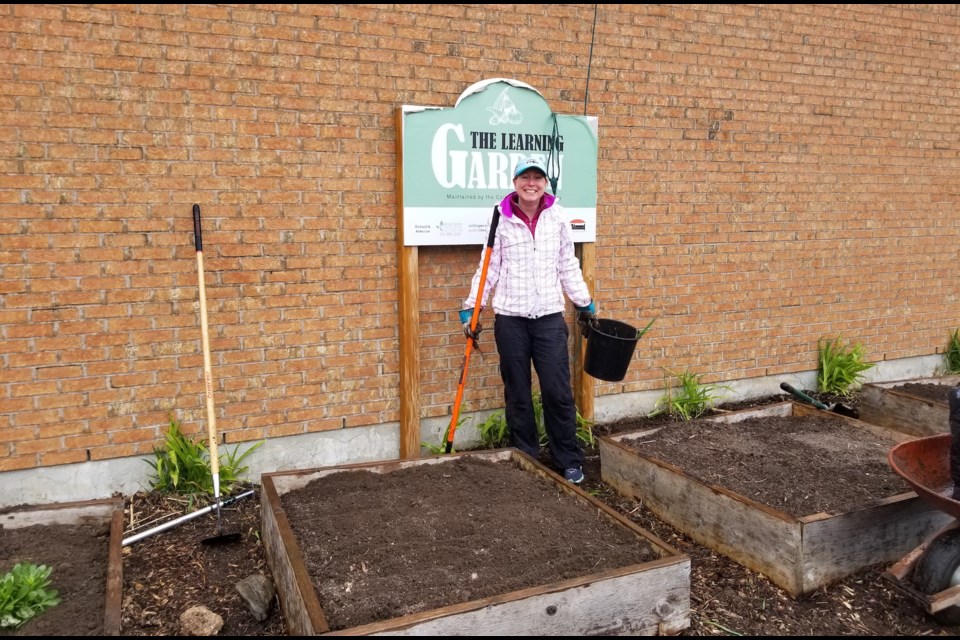A Collingwood group is hoping to create a buzz and get more people fluttering around home gardens.
Pollinate Collingwood is a newly formed group that aims to raise awareness for our role in environmental stewardship. The organization is dedicated to helping residents understand how they can support local ecosystems through the planting of pollinating gardens.
“It’s the bigger picture about getting the word out, getting people to think about the broader ecosystem and how they can play their part,” said Jessica Lehr, co-founder of Pollinate Collingwood.
Wild pollinators like butterflies and bees are crucial to human survival, yet climate change and pesticide use are compromising their natural habitat and food sources. Pollinate Collingwood’s mission is to bring bee and butterfly habitats back.
The organization was inspired by The Butterflyway Project, an initiative created by the David Suzuki Foundation to help communities play their part to help keep pollinators from extinction.
The citizen-led movement began in five Canadian cities in 2017. Over the past three years, the project has connected teams of volunteer 'Butterflyway Rangers', whose mission is to plant native wildflowers in yards, schoolyards, streets and parks in their communities to establish a “highway for butterflies” across the country.
When Lehr first learned of the initiative last fall, she was keen to get Collingwood involved.
Lehr spoke with the horticultural society and the Nature League, and as interest continued to grow, it expanded to include business owners and local landowners interested in hosting a native garden of their own.
Serendipitously, she was connected with her co-founder, Jeff Young, who was an avid gardener himself and a member of the trail committee for the Town of Collingwood. Together, they become Collingwood’s first Butterflyway Rangers.
“After we connected it really snowballed to what it is now,” said Young.
Along with the Butterfly Ranger program, the David Suzuki Foundation developed the National Butterflyway Schools Program, which was set to launch this spring. The program would provide participating schools with free wildflowers, a Butterflyway garden sign and educational materials.
“I have always been interested in environmental stewardship, and this is a great way to empower people to make these small changes,” said Lehr. “It’s a feel-good project that everyone can do, and they can make a difference.”
The coronavirus pandemic temporarily put a halt to the school program — which is scheduled to launch this fall instead — but Lehr and Young still thought Butterflyways were important, and they became determined to carry on in any way they could.
They connected with Return of the Native, a nursery in Elmvale that grows and sells plants native to Simcoe County, and ordered 600 plants for the community.
Due to the pandemic, they were no longer able to plant in some of the town’s gardens, so they started looking to local businesses and organizations interested in hosting a Butterflyway garden instead.
“We have the plants, we just need to find people who are committed to hosting and caring for them,” said Lehr. “We will do whatever we can to get them in the ground.”
Through its social-media channels and word of mouth, Pollinate Collingwood continued to gain traction, and several businesses stepped up to support the initiative.
Confirmed sites now include the Learning Garden (outside the Simcoe Street Theatre), Heritage Park Garden, Red Scarf Equestrian Inc., The Wild Stand General Store, Free Spirit Gardens, and Collingwood Brewery, among many others.
Other businesses and clubs who are interested in getting involved are encouraged to consider sponsoring a garden.
“It’s been tricky adapting, but we know we have this bigger agenda,” said Lehr.
Lehr and Young are personally helping with the planting process, making sure to keep physical distancing measures in place at all times. Moving forward, they hope Pollinate Collingwood will become an educational outlet as well — a place members of the community can turn to for advice and information on native planting.
“For someone who just stumbled into gardening, it’s pretty overwhelming,” said Young. “It’s nice to have someone with a bit of experience.”
Plants native to this community include common, swamp, and butterfly milkweed, pearly everlasting, and golden alexander, which support monarchs, painted lady and black swallowtail butterfly species, respectively, all of which support native bee species as well.
Native trees and shrubs also work the same way as hosts for specific species, such as Hackberry, which hosts mourning cloak and question-mark butterflies.
“I think in the past, native plants were always associated with weeds, given their poor names, but you are starting to hear about it more, and we want to encourage that as much as we can,” said Young.
Lehr and Young both hope that the visibility of community gardens will show people how beautiful native plants can be, and encourage them to start planting them in their backyards.
“The opportunity with people’s lawns is massive,” said Lehr. “They say the country's biggest natural parks are pollinators patches in people’s backyards.”
“It’s part of the bigger picture,” added Young. “Insects and bug populations are declining everywhere, but if you increase that, you will see more birds, and see more animals. It will build and build. The more you can bring nature to people, the more they have respect for it and will build that interest.”
Lehr is excited to revisit the school program in the fall, and is looking to connect with teachers who may be interested.
Moving forward, she also hopes to host an educational evening that will include seminars and discussions on native planting. In the meantime, now might be as good a time as ever to develop a green thumb,
“Once you start, you won’t stop, and you’ll probably end up with your entire backyard filled with native plants like I did,” laughed Young.
You can find Pollinate Collingwood on Facebook if you're interested in participating in the initiative or have questions about pollinator gardens.

.png;w=120;h=80;mode=crop)

